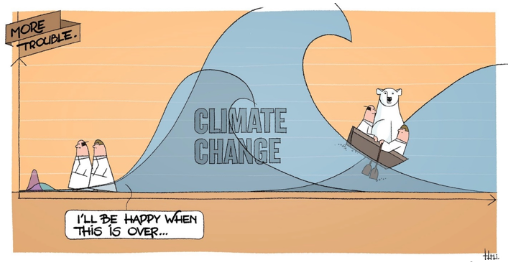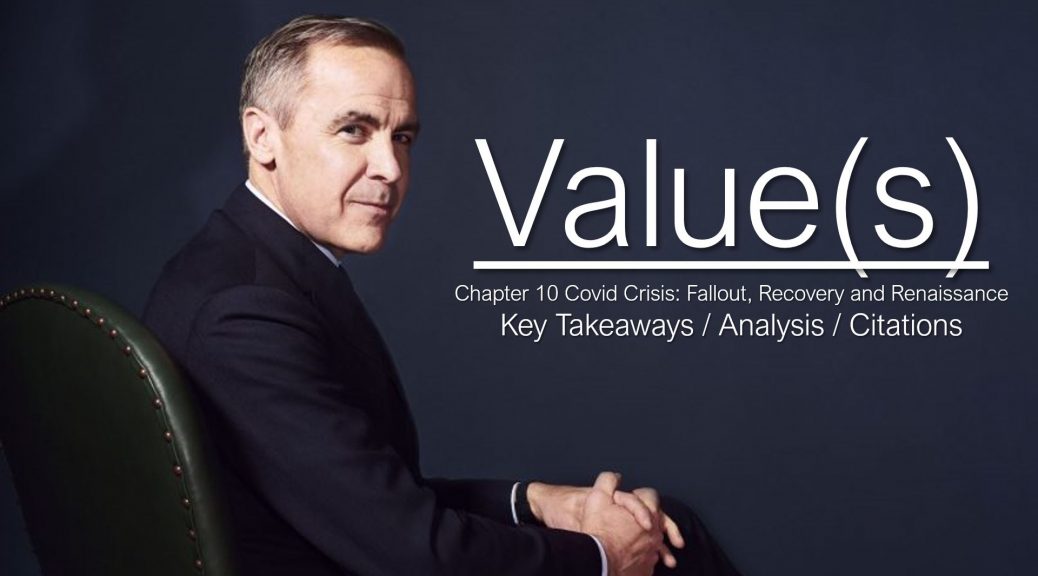Chapter 10: Covid Crisis: Fallout, Recovery and Renaissance
Key Takeaways
The reality is that mobility did decline as people accepted the lockdowns. State legitimacy is ensured by containing the virus. A lot of what Carney is saying here is a summary of what is relatively uncontroversial. He discusses the framework for the common good. Is that it is possible to calculate that value of a given person? The solidarity of citizens is important to note here, because the view was that no one should die in this pandemic regardless of age (or rather that folks did not want to contract this virus).

Other topics:
- Perceived fairness of healthcare: you cannot have one set of rules for the rich and another for general citizens.
- Value of a senior versus other citizens.
- The young will have to pay twice in increased taxes and the depression of the moment.
- Kids with internet had an advantage in home schooling.
- Value creation and destruction increased under Covid.
- R0 as the metric is a useful anchor just as the 1.5 degree Celsius increase to evade the most harmful effects of climate change.
- Managing R0 was the core activity of this pandemic as far as governments were concerned.
- Carney rationally described how the government that is presented ought to appear competent.
- Local businesses will be emphasized over global for years to come.
- There will be future black swans, no kidding.
- We have continued to move towards market society however, in this Covid crisis, we have “acted like Rawlsians and communitarian rather than utilitarians and libertarians.” (260, Value(s)).

Covid and Climate Change
- Carney predicts that the pandemic’s post active phase will see an increase the societal confidence in science, demands for stakeholder capitalism
- Carney then draws a parallel between Covid and climate change. Using science to inform decision making for example. Having targets. How no country can isolate for each other in a pandemic or a climate crisis.
Analysis of Part 2 Chapter 10:
- Leadership means being a custodian to the long-term. It’s not about you, says Carney.
- There is a so what to this chapter….it falls short of saying anything about how the issuance of debt what appropriate or not. He didn’t talk about work from home or how the virus works which is a missed opportunity.
- Carney seems to downplay the fact that the biggest failing of the pandemic is actually that government are operated by people who are focused inwardly in their own self interest within the architecture they have inherited. And such there is a lack of real time data to respond to the real society as it is occurring. There is a high lack information between citizen and government. The government should get out of the way for those who want that and step in for those who need help. Being able to distinguish between complex contradictory people as we all are is critical. It’s a credit card for UBI, it’s an interface to detail ones preferences voluntarily, it’s a relationship that is not simply a marketing blast….
- Carney makes sweeping claims here that are sufficiently inoffensive to warrant much comment. There are no innovative sliders that he trials in this chapter, there was a lot of spicy behaviour in Covid but Carney manages to keep it very potatoe.
- Surprised he doesn’t go after thie no mask wearers and other violators of lockDown. We tend to forget that these regulations were ignored by millions of people as they were ill enforced…
Citations Worth Noting for Part 1: Chapter 10
- World Health Organization, ‘Coronavirus disease 2019 (COVID-19) Situation Report – 11’, 31 January 2020.
- Christian von Soest and Julia Grauvogel, ‘Identity, procedures and performance: how authoritarian regimes legitimize their rule’, Contemporary Politics 23 (3) (2017), pp. 287 – 305.
- Stephanie Hegarty, ‘The Chinese doctor who tried to warn others about coronavirus’, BBC, 6 February 2020.
- Ruth Igielnik, ‘Most Americans say they regularly wore a mask in stores in the past month; fewer see oher doing it’, Pew Research Center, 23 June 2020.
- Timothy Besley, ‘State Capacity, Reciprocity, and the Social Contract’, Econometrica 88(4) (July 2020), p. 1309 – 10.
- Allan Freeman, ‘The unequal toll of Canada’s pandemic’, iPolitics, 29 May 2020.
- Daniel Kahneman, Thinking, Fast and Slow (London: Allan Lane, 2011).
- Timothy Besley and Nicholas Stern, ‘The Economics of Lockdown’, Fiscal Studies 41(3) October 2020), pp. 493 – 513.

